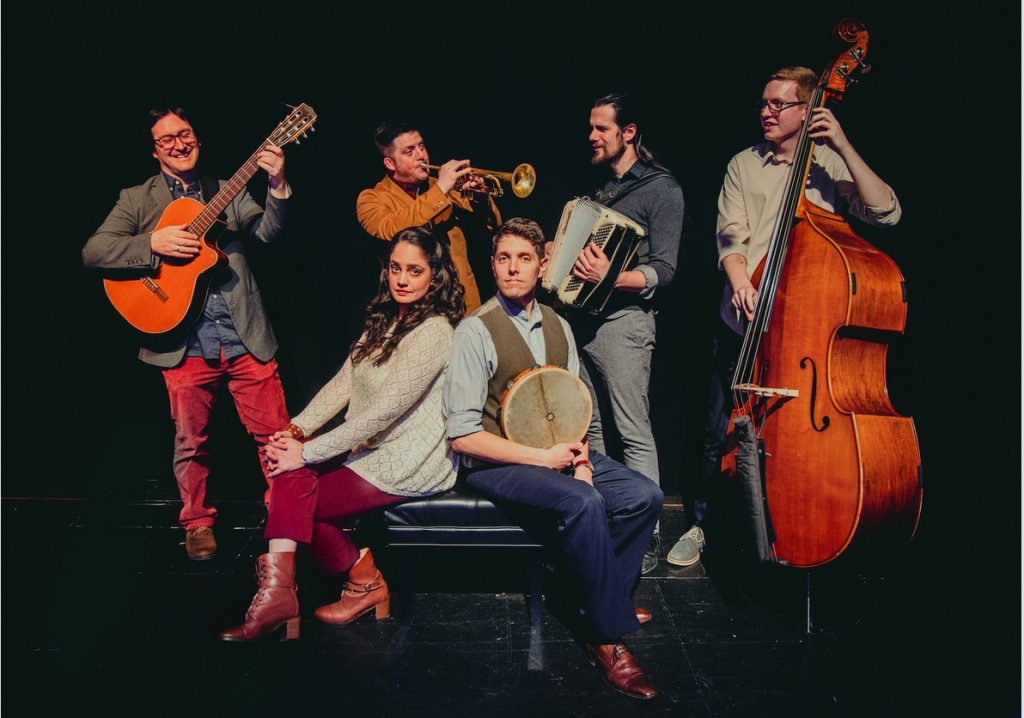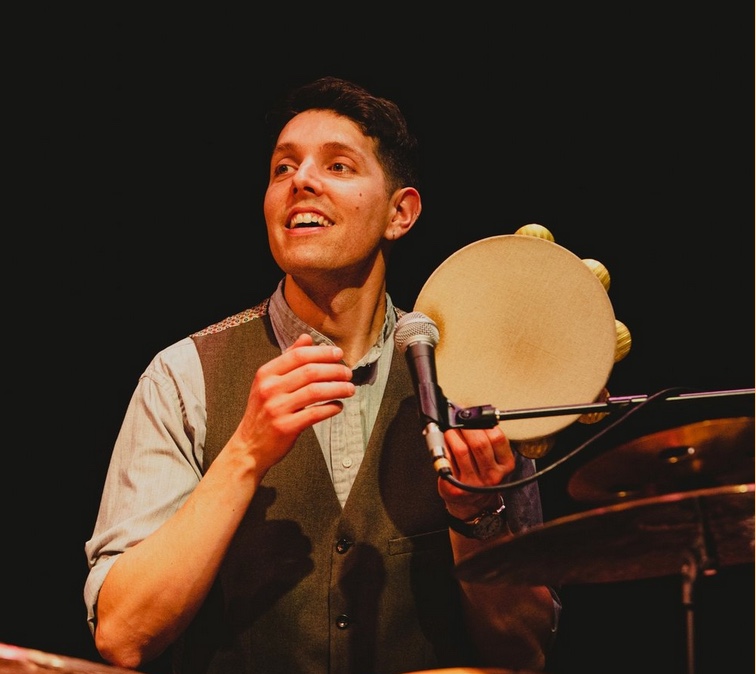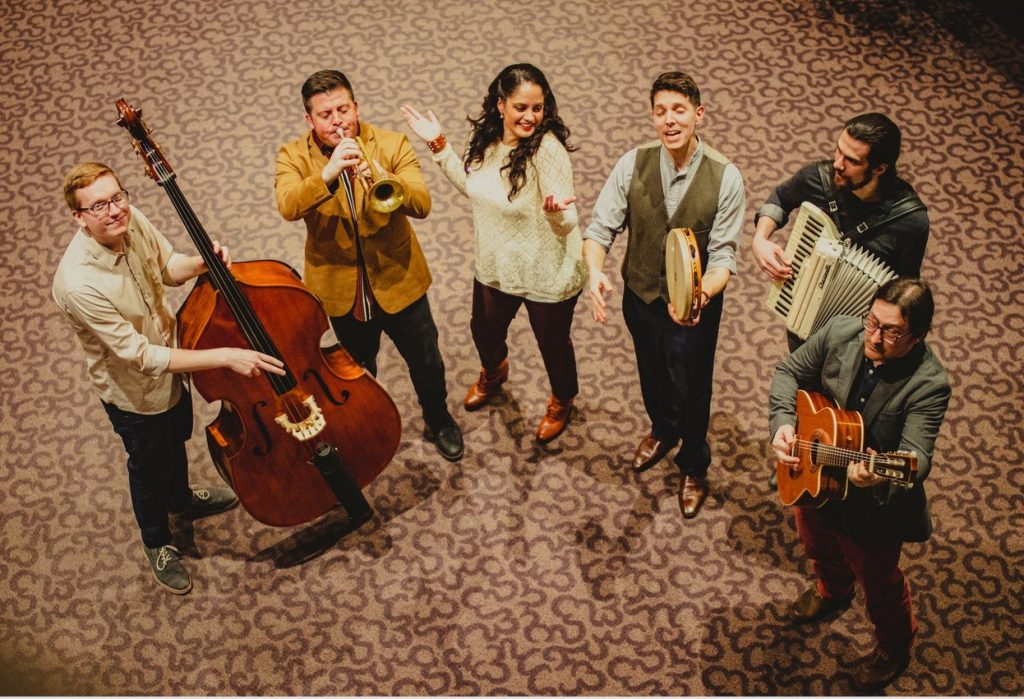by Mike Telin

“My dad being from Italy, I thought that writing about Italian folk music would be a cool way to kind of dig into my roots,” the Cleveland native said during a recent conversation. “I was absolutely dumbfounded by how beautiful and diverse the music was. I was so impacted by that — it was the first time I felt like my heritage and my profession collided. So I made a mental note to figure out some way to bring recognition to this beautiful art form.”
After completing a master’s in composition at Youngstown State University, touring North America and Europe, and being featured on over 30 albums, Taddeo decided to turn to the Italian folk music he had fallen in love with as an undergraduate.
On Wednesday, January 24 at 7:30 pm at the Cleveland Museum of Art’s Gartner Auditorium, Taddeo’s modern Italian folk group, Alla Boara, will celebrate the release of their second album, Work & Song. Recorded live at the Bop Stop this past summer, the album features a cast of stars including vocalist Amanda Powell, guitarist Dan Bruce, trumpeter Tommy Lehman, bassist Ian Kinnaman, accordionist and keyboardist Clay Colley, and Taddeo himself on percussion. Tickets are available online. Click here and here to watch the group’s latest videos.
I spoke to Anthony Taddeo by phone and began by congratulating him on the group’s success.
Mike Telin: I can’t remember when Alla Boara first appeared on our concert schedules, but I think it was a couple of years ago when you were performing at Cain Park sponsored by the Local 4 Music Fund. And boy, the group is everywhere now — congratulations.
Anthony Taddeo: Thank you so much. It’s a lot of work, but we’re trying to ride the wave, as it were, and just go with it while it’s fun and exciting.
MT: Before we dive into the album, until I read your email I was not aware that Alan Lomax had made field recordings in Italy.
AT: A lot of people don’t know that, and the only reason I do is because I stumbled upon it by accident.
MT: How much music did you discover?
AT: Alan Lomax has an 11-disc compilation of that music called Italian Treasury. Each disc is separated into the different regions that he visited. If I remember correctly he had 3,000 recordings and over 200 hours of music that he recorded while he was there.
MT: Amazing. But on to the heart of this conversation, which is the group and the new album release — how did you manage to get such great musicians to be part of the project?
AT: I think that everybody in the Cleveland/Northeast Ohio music scene kind of knows one another pretty well, especially when you get into the more niche places like the Baroque or the jazz music scene. So over my time as being just a consummate sideman, I actually had the opportunity to work with all these people. When it came time to think about putting a band together, I kind of identified the textures that I wanted, like accordion and guitar. I wanted some strings and I wanted some brass, so I was thinking trumpet. And obviously if we’re going to have an Italian folk band, you need to have the vocals.
The few times that I had worked with Amanda — who is remarkable — she displayed such a profound knowledge of the different languages that she was singing in. And the way that she would study and prep for those different languages, I knew if she could do it, then we would be in good shape.

AT: I do all the arranging for the group. Of course when you bring an arrangement to a band, you’re hoping that they will give their input. As we go through the different versions, they add their two cents and it’s always valuable.
I think we’ve developed a trust to where it does feel like a band. It feels like we’re friends who enjoy being together and playing music and traveling together. That was another thing that was at the forefront of my mind, having toured with other bands where not everyone got along, which is a miserable experience. So I knew that it would be important to get people who would be a pleasure to work with.
MT: I’m curious about the album’s title, Work & Song. If I did my googling correctly, Alla Boara means “to the work.” Is there a reason for the similarity between the album’s title and group’s name, or is it just a coincidence?
AT: Alla Boara or “to the work” is like an expression that denotes that this style of folk music is for work in the fields. When it came to naming the band, I just liked the look and sound of Alla Boara. I also thought the meaning hearkened back to the music of the people so well, and I wanted everything about the project to be focused on the folk music side of Italian music.
And then “work and song” is from the liner notes by Alan Lomax. He was describing everything that he captured — I really liked the way that it sounded and I think the English version kind of encapsulates what we’re about. And because we have a lot of stuff out there in Italian, sometimes you have to put something in English. You’ve got to help people along a little bit.
MT: What will audiences be treated to at the Museum?
AT: This is a really exciting show, mainly because we’re releasing the album but also because we have special guests. We have Caitlin Hedge on violin and Patrick Grainy on percussion — he was on the live recording at the Bop Stop as well. So we’re debuting new compositions that feature the violin, and that’s something that’s exciting for me personally. There’s violin in a lot of Alan Lomax’s field recordings, and it’s a sound that I’ve been wanting to figure out how to include. I met Caitlin a few months ago and she’s just wonderful. So it will be fun to debut these new songs.
MT: There are so many great players in the area, living life, creating music and art along the way.
AT: This specific period feels important to me. It’s like Cleveland over the last ten to fifteen years has gone through a renaissance where people are staying and creating here like never before. And that’s so important because when I was growing up here, as soon as anyone started to play at a certain level, they just left. And to have people stick around and create things is so revitalizing. It’s exciting. It’s motivating. It’s a really wonderful time to be here.
MT: You’re right. I’ve certainly noticed that things have changed for the better. Along those lines I was wondering if you’d like to give a shout-out to the Local 4 Music Fund.
AT: What they’re doing is incredible. Growing up I was kind of leery of the term “musician’s union” — I’d heard so many horror stories. And then to meet Amber [Rogers] and Leonard [DiCosimo] and to see all the things that they’re doing, I mean, they’re just doing everything you would hope for by actually supporting and creating work for musicians. And they’re awesome to work with.
MT: Maybe this question is for people who are not familiar with Alan Lomax and the importance of what he did. But this is not your pizzeria music, if you will. How do you describe it to people?
AT: That’s something we’re still figuring out. I do think what is important about the group is that the music is really fun. I mean, we’re not boxing ourselves in, like, ‘hey, it’s classical, or jazz, or world music.’ We pride ourselves in being eclectic in a way that leaves the door open for people who love different musical styles to find their place at our concerts.
I think the most important thing about the group is that we’re taking this music that is little known, especially in American culture, and adding these elements of modernity that make it more accessible to a wider audience.
And our hope is that we would inspire people to check out their musical roots — to think about what their grandparents were singing. I think there’s a lot of merit in digging into our roots and finding a little bit of our musical voice, our creative voice, our artistic voice, in our ethnic groups.
MT: I agree 100% but I’ll tell you, everyone in the group is a well-trained musician — you can’t be a hack and pull off what you’re doing.
AT: Thanks. Like I was hinting at earlier, this whole process has been so joyful and exciting and meaningful, and that’s part of what keeps pushing me forward. It still feels so fresh every time I sit down to write a new arrangement or every day that I send out more emails or whatever. It still feels exciting. It still rejuvenates me every day. It’s a beautiful thing.
Published on ClevelandClassical.com January 18, 2024.
Click here for a printable copy of this article



